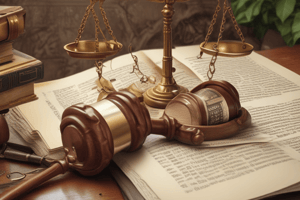Podcast
Questions and Answers
Which model of justice is primarily concerned with compensating for harms caused to individuals?
Which model of justice is primarily concerned with compensating for harms caused to individuals?
- Instrumentalist Justice
- Corrective Justice (correct)
- Retributive Justice
- Distributive Justice
Distributive Justice addresses the distribution of assets and entitlements among individual members of society.
Distributive Justice addresses the distribution of assets and entitlements among individual members of society.
False (B)
What is one of A.V. Dicey’s three core principles of the Rule of Law?
What is one of A.V. Dicey’s three core principles of the Rule of Law?
Law must have supremacy over arbitrary power or The law applies equally to everyone.
The principle that "no one is above the law" is a significant aspect of the ________ system.
The principle that "no one is above the law" is a significant aspect of the ________ system.
Match the models of justice with their primary focus:
Match the models of justice with their primary focus:
Which of the following describes a condition rule?
Which of the following describes a condition rule?
A disjunctive statute requires all elements to be satisfied in order to obtain a legal result.
A disjunctive statute requires all elements to be satisfied in order to obtain a legal result.
What is the primary function of law in society?
What is the primary function of law in society?
The rules that prohibit activities such as murder or careless driving are referred to as ________ rules.
The rules that prohibit activities such as murder or careless driving are referred to as ________ rules.
Match the following types of rules with their descriptions:
Match the following types of rules with their descriptions:
In a conjunctive statute, the elements are joined by which term?
In a conjunctive statute, the elements are joined by which term?
Morality is defined as a set of legal enforceable rules.
Morality is defined as a set of legal enforceable rules.
What term describes the rules that allow the definition of legal relationships, such as contracts?
What term describes the rules that allow the definition of legal relationships, such as contracts?
Flashcards
What is Law?
What is Law?
A set of enforceable rules that regulate interactions between individuals and society.
General Standards of Behavior
General Standards of Behavior
Rules that prohibit certain actions, like murder or reckless driving.
Condition Rules
Condition Rules
Rules that specify requirements or conditions that need to be met, like obtaining a driver's license.
Power-Conferring Rules
Power-Conferring Rules
Signup and view all the flashcards
Structure of Rules
Structure of Rules
Signup and view all the flashcards
Conjunctive Rule
Conjunctive Rule
Signup and view all the flashcards
Disjunctive Rule
Disjunctive Rule
Signup and view all the flashcards
Morality
Morality
Signup and view all the flashcards
Corrective Justice
Corrective Justice
Signup and view all the flashcards
Retributive Justice
Retributive Justice
Signup and view all the flashcards
Distributive Justice
Distributive Justice
Signup and view all the flashcards
Rule of Law
Rule of Law
Signup and view all the flashcards
Dicey's Core ROL Principle
Dicey's Core ROL Principle
Signup and view all the flashcards
Study Notes
Law as a System of Rules
- Law is a system of enforceable rules governing relationships within a society, balancing individual and societal needs.
- Rules can be categorized as:
- General standards: prohibiting specific actions (e.g., murder, reckless driving).
- Conditional rules: establishing requirements (e.g., driving).
- Power-conferring rules: allowing individuals to establish legal relationships (e.g., contracts, wills).
- Rule structure often follows "if A, B, and/or C, then X" format:
- Conjunctive rules require all elements (joined by "and") to achieve the legal outcome. Examples include criminal acts needing actus reus, mens rea, and causation for conviction.
- Disjunctive rules require only one element to be met (joined by "or") - prevalent in civil cases.
Conjunctive vs. Disjunctive Statutes
- Statutes using "and" are conjunctive; all listed elements must be proven.
- Statutes using "or" are disjunctive; proof of any element is sufficient.
Example of a Disjunctive Statute
- The Dog Owners' Liability Act is disjunctive, as liability arises from a bite or attack.
Law and Morality/Ethics
- Morality involves principles of right and wrong in human behavior.
- Law and ethics share a common value system, with ethical considerations often underlying legal frameworks for professional conduct.
Models of Justice
- Corrective Justice: focuses on rectifying harm caused (e.g., compensation in civil disputes).
- Retributive Justice: emphasizes punishment proportionate to the crime (often a blend of deontological and utilitarian perspectives).
- Distributive Justice: addresses societal asset distribution (e.g., government programs).
Rule of Law (ROL)
- Foundational principle of legal systems, stressing fair administration and equal treatment.
- Key tenets are:
- Equal treatment before the law.
- Non-arbitrary use of power.
ROL's historical roots
- Present in Greek, Roman, and medieval legal traditions.
- Encapsulated in documents like the Magna Carta (1215), limiting royal power.
A.V. Dicey's Principles of ROL
- Law's supremacy over arbitrary power.
- Equal application of the law to all.
- Legal remedies for denied rights or liberties.
Studying That Suits You
Use AI to generate personalized quizzes and flashcards to suit your learning preferences.



